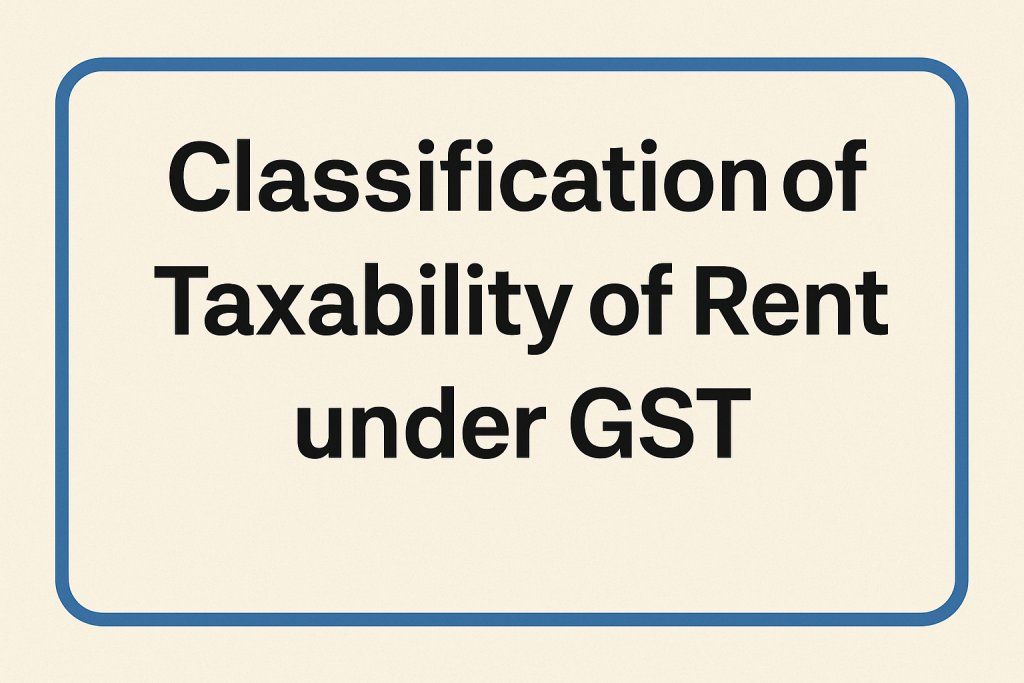Classification of Taxability of Rent under GST

1. Residential Property Rentals
Under GST law, the taxability of residential property rentals depends on the registration status of the landlord and tenant and the purpose for which the property is used.
- Unregistered Landlord to Unregistered Tenant:
When a residential dwelling is rented by an unregistered landlord to an unregistered tenant, it is exempt from GST. - Unregistered Landlord to Registered Individual (Personal Use):
If a residential property is leased by an unregistered landlord to a registered individual for personal use, it is exempt. - Unregistered Landlord to Registered Individual (Proprietorship):
When the registered individual is using the dwelling for a proprietorship concern (i.e., for business), GST is applicable on a Reverse Charge Mechanism (RCM) - Unregistered Landlord to Registered Non-Individual (Company, LLP, etc.):
The transaction becomes taxable under RCM since the property is being used for business purposes. - Registered Landlord to Unregistered Tenant:
If a registered person rents out a residential property to an unregistered person, it is exempt. - Registered Landlord to Registered Individual (Personal Use):
Renting for personal use continues to be exempt under GST. - Registered Landlord to Registered Individual (Proprietorship):
Taxable on RCM basis as the property is being used for business. - Registered Landlord to Registered Non-Individual (Company, LLP, etc.):
Taxable under RCM.
2. Commercial Property Rentals
Commercial properties are generally subject to GST, with the mechanism depending on the registration status of the landlord and tenant.
- Unregistered Landlord to Unregistered Tenant:
Such a transaction is exempt under GST as neither party is registered. - Unregistered Landlord to Registered Tenant (Normal Scheme):
This is taxable on RCM basis, meaning the tenant is required to pay GST. - Unregistered Landlord to Registered Tenant (Composition Scheme):
Exempt from GST. - Registered Landlord to Unregistered Tenant:
Taxable on Forward Charge Mechanism (FCM) — landlord must charge and pay GST. - Registered Landlord to Registered Tenant (Normal Scheme):
Taxable on FCM — GST charged by landlord. - Registered Landlord to Registered Tenant (Composition Scheme):
Taxable on FCM — GST charged by landlord.
To determine whether GST is applicable on the rent you pay or receive, you need to identify:
- Who are you? – Are you the landlord or the tenant?
- What is your GST registration status? – Are you registered under GST or unregistered?
- Who is the other party? – Is your tenant or landlord registered or unregistered?
- What is the nature of the property? – Is it residential or commercial, and is it used for personal or business purposes?
Taxability Matrix
Landlord | Tenant | Nature of Dwelling | Taxability |
Unregistered | Unregistered | Residential | Exempt |
Unregistered | Registered Individual | Residential (on personal account) | Exempt |
Unregistered | Registered Individual | Residential (on account of proprietorship concern) | Taxable on RCM basis |
Unregistered | Registered (other than Individual) | Residential | Taxable on RCM basis |
Registered | Unregistered | Residential | Exempt |
Registered | Registered Individual | Residential (on personal account) | Exempt |
Registered | Registered Individual | Residential (on account of proprietorship concern) | Taxable on RCM basis |
Registered | Registered (other than Individual) | Residential | Taxable on RCM basis |
Unregistered | Unregistered | Commercial | Exempt |
Unregistered | Registered (normal scheme) | Commercial | Taxable on RCM basis |
Unregistered | Registered (composition scheme) | Commercial | Exempt |
Registered | Unregistered | Commercial | Taxable on FCM basis |
Registered | Registered (normal scheme) | Commercial | Taxable on FCM basis |
Registered | Registered (composition scheme) | Commercial | Taxable on FCM basis |



